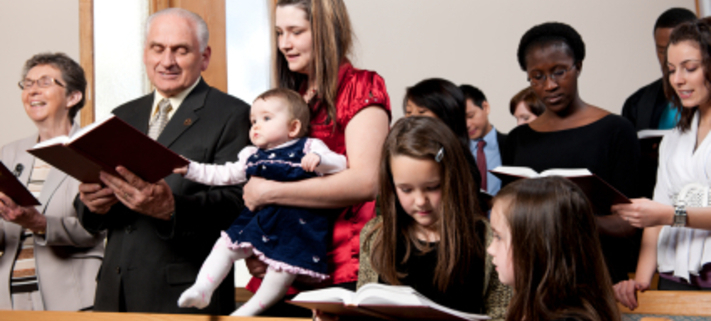Why Do We Have Creeds?
What kind of a foundation does a building contractor build before erecting a building? It all depends on what kind of building he’s putting up. Is it a playhouse for children? Or is he building a skyscraper?
The same rule applies when you’re building a Christian life. God has not called us to be starry-eyed sentimentalists, with our feet firmly planted in mid-air. God wants his children to live confidently, not to wobble through our lives somehow and finally to stumble out into the dark.
There are those today who prefer to believe that human beings are independent to God, that there is no supernatural being to whom we are accountable. Folks like that honestly believe that we determine what’s good for us and what’s bad, what’s true and what’s false.
The order of worship we follow when we gather with our fellow Christians each week includes a creed, a statement of what we believe – about God, and about life. Martin Luther once made the statement: “Every person has to do his own believing, just as every person has to do his own dying.” The Christian Church has three creeds: the Apostles’, the Nicene, and the Athanasian.
The best-known of the three – the one you may know by heart – is the Apostle’s Creed. The foundation for this creed was laid by Christ himself when he commissioned his disciples, “Make disciples of all nations, baptizing them in the name of the Father and of the Son and of the Holy Spirit.” From the earliest days of the Christian Church, candidates for baptism were required to make a public declaration of their faith. The Apostles’ Creed may have evolved from that public declaration of faith. Since this was a personal creed, the speaker spoke singularly, saying, “I believe . . .”
Several hundred years later the Nicene Creed was adopted by the Christian Church. (Nicea was a city in Turkey.) The Emperor Constantine convened a Council of the Christian Church to settle a controversy created by a teacher named Arius, who denied that Jesus is God. Arius taught that Jesus as the Son of God was created, not eternal like God the Father. Although the Nicene Creed was not used as a baptismal declaration, it specifically addresses the error of Arius. Every time we confess the Nicene Creed, we declare that Jesus is “the only Son of God, eternally begotten of the Father, God from God, Light from Light, true God from true God . . . of one being with the Father.” It is because this was a creed to be confessed by the whole church that we speak it with plurality, saying, “We believe . . .”
We don’t know who the author of the Athanasian Creed is, but it’s generally agreed that this creed is a couple hundred years younger than its two sisters. It’s much longer than the others. We therefore don’t use it regularly in our weekly worship services. But the Athanasian Creed offers a clear expression of the most basic truths of the Christian religion.
These three ancient creeds don’t make much sense to the three pounds of pinkish-gray jelly between our ears. Each of the three confesses that in one Godhead there are three distinct persons. Each of the three confesses that the Son of God became a human being to rescue lost sinners. Pretty mind-blowing stuff when you try to understand it!
These three creeds – Apostles’, Nicene, and Athanasian – were the ancient church’s way of putting its money where God’s mouth was.







